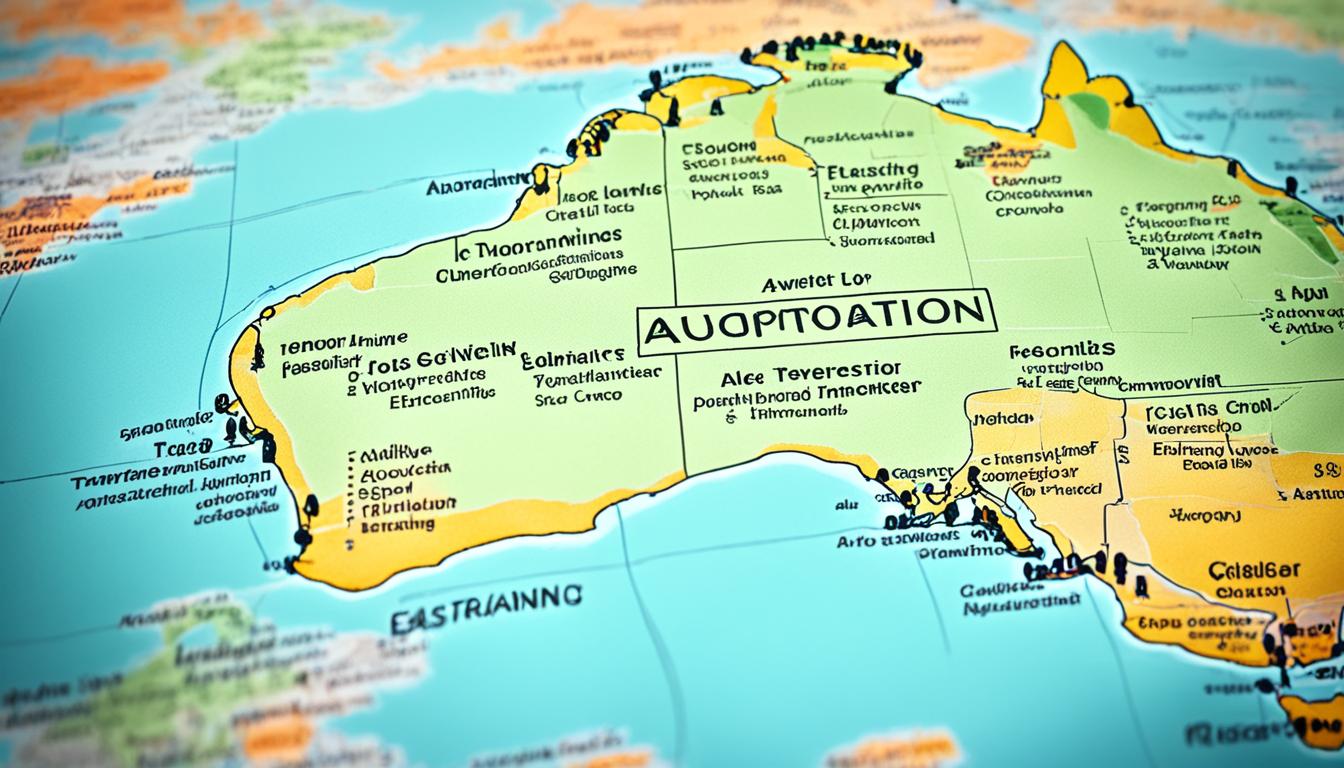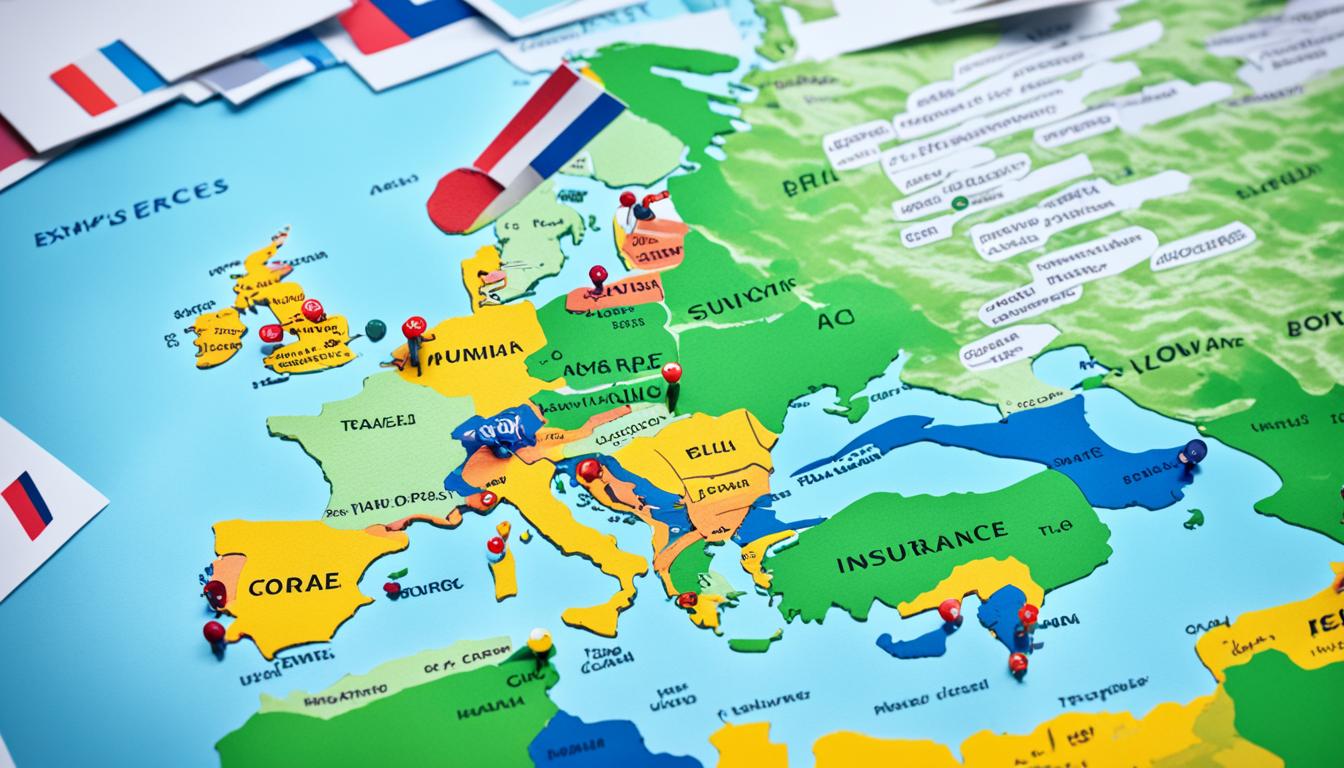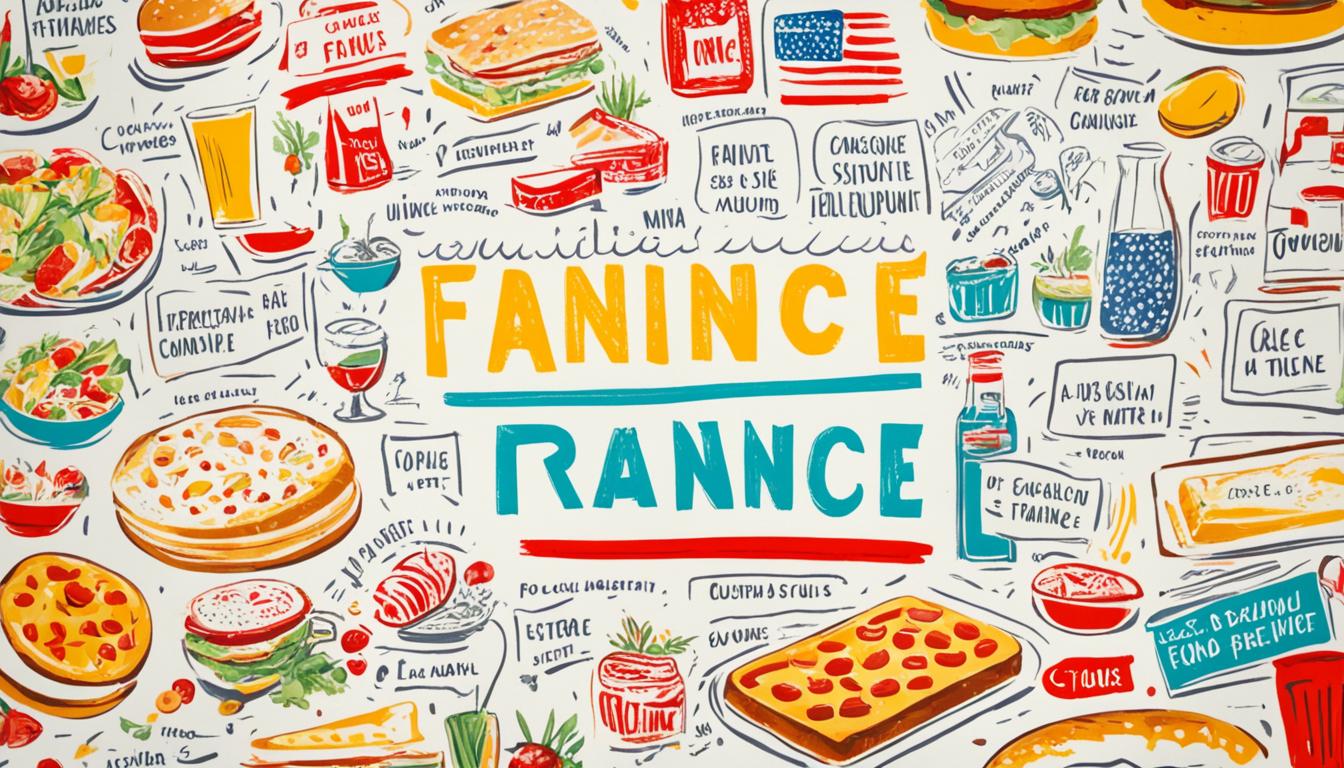
Planning a trip to France? Wondering what food items you can bring with you? It’s essential to familiarize yourself with the food restrictions and regulations imposed by French customs to ensure a smooth journey. In this article, we will guide you through the permissible food items, as well as provide insights into understanding French customs regulations.
Key Takeaways:
- Before your trip, make sure to familiarize yourself with the regulations set by French customs regarding the importation of food items.
- There are certain food items that you can bring to France without any issues, but they must meet specific criteria.
- Packaged and non-perishable foods are generally allowed, but there are guidelines to follow.
- Bringing fresh fruits and vegetables requires extra caution due to agricultural regulations.
- Meats and animal products are highly regulated and have strict rules for importation.
Now, let’s delve into the details of what food you can take to France and how to navigate the French customs regulations, ensuring a delightful and hassle-free food experience during your trip.
Understanding French Customs Regulations
Before packing your bags for a trip to France, it’s essential to understand the regulations set by French customs regarding the importation of food items. Familiarizing yourself with these rules will ensure a smooth journey and help you avoid any unnecessary complications at the border.
France takes its food regulations seriously to protect its agricultural heritage, ensure food safety, and prevent the introduction of pests and diseases. As a result, there are strict guidelines in place for bringing food into the country.
Import Restrictions and Declarations
When it comes to food, French customs adheres to import regulations designed to safeguard public health and maintain agricultural standards. These regulations encompass various categories of food items, including packaged foods, fresh fruits and vegetables, meats and animal products, dairy products and eggs, and alcoholic beverages.
It’s important to note that while some food items are subject to restrictions, others may require declaration upon entry. This means that even if a particular food is allowed, you may still need to declare it at customs. Failure to do so could result in penalties.
Understanding the specific regulations for different types of food items will help you navigate customs with confidence and avoid any potential issues. Let’s delve into the various categories of food items and their associated regulations.
Foods Allowed in France
France permits the importation of certain food items that meet specific criteria. These items include commercially packaged and sealed foods, non-perishable items, and specific dietary considerations such as gluten-free, vegan, or kosher foods.
Foods with Restrictions
Some food items, like fresh fruits and vegetables, meats, and dairy products, have specific guidelines and restrictions imposed by French customs.
Non-Permissible Foods
There are also food items that are categorically not allowed to be brought into France. Understanding these restrictions is essential to avoid any legal issues and ensure compliance with French customs regulations.
Declaration Process
If you’re unsure whether a particular food item is allowed, it’s always best to declare it at customs. Being transparent about the contents of your luggage can streamline your entry process and prevent any unwanted surprises.
By understanding and adhering to French customs food regulations, you can enjoy your trip to France while respecting the country’s culinary and agricultural standards.
Permissible Food Items
While there are restrictions, there are also food items that you can bring to France without any issues. In this section, we will explore the permissible food items that you can pack in your luggage.
France offers a delightful culinary experience, but it’s natural to want to bring certain food items from home to enhance your travel experience. Fortunately, there are several food items that you can legally bring into France without violating any customs regulations.
Non-perishable Foods
If you’re wondering what non-perishable foods you can bring, the good news is that most packaged and sealed non-perishable items are allowed. This includes items such as canned goods, pasta, rice, snacks, and spices. Just make sure that the packaging is intact and the product is commercially sealed.
Specialty Foods and Condiments
If you have a particular love for a specific brand of mustard or a unique spice blend, you’ll be relieved to know that you can bring these specialty foods and condiments with you. Whether it’s a jar of your favorite jam or a jar of truffle oil, these items are generally permitted.
Chocolates and Candy
A trip to France wouldn’t be complete without indulging in some of their exquisite chocolates. If you have a sweet tooth, you can bring your favorite chocolates and candy along. From rich, velvety truffles to classic bars, they’re all welcome in your luggage.
Baked Goods
If you’re a fan of homemade cookies or bread, you can bring them to France as well. While there may be restrictions on fresh bread due to agricultural regulations, packaged baked goods are typically allowed. Just make sure they’re properly sealed to prevent any issues with customs.
Remember, it’s always a good idea to check with the airline you’re traveling with and review the specific regulations set by French customs to ensure you comply with all guidelines. Now that you know what food items you can bring, you can add a taste of home to your French adventure.
Packaged and Non-Perishable Foods
When packing food for your trip to France, it’s essential to include a selection of packaged and non-perishable options. These items are generally allowed into the country and can be convenient for quick and easy meals during your travels. Here is a comprehensive list of food items that you can bring with you to France:
| Food Item | Description |
|---|---|
| Canned vegetables and fruits | These non-perishable options can be a great addition to your meals. |
| Dried pasta and rice | Consider packing these staples for a quick and filling meal option. |
| Cereal and granola bars | Perfect for breakfast or a snack on the go. |
| Nuts and trail mix | A nutritious and portable snack for your adventures. |
| Crackers and biscuits | Pair them with cheese or spreads for a delicious snack. |
| Preserves and spreads | Bring your favorite flavors to enjoy with bread or pastries. |
| Dried herbs and spices | Enhance the flavors of your meals with these pantry essentials. |
| Instant coffee and tea | For those who crave a familiar caffeine fix. |
Feel free to mix and match these items to create a variety of meals during your trip. However, be sure to check the specific regulations and restrictions imposed by French customs to ensure that you comply with all guidelines.
While these packaged and non-perishable foods provide convenience, it’s also worth exploring the local culinary offerings in France. The country is known for its exquisite cuisine, and experiencing the local food is an integral part of any trip. Immerse yourself in the French gastronomic culture and savor the flavors at local markets, cafes, and restaurants.
To help you visualize the variety of packaged and non-perishable foods you can bring to France, take a look at the image below:
“Packing a selection of packaged and non-perishable foods ensures you have convenient meal options during your trip to France. But don’t forget to indulge in the local gastronomy that makes this country a culinary paradise!”
Fresh Fruits and Vegetables
When bringing food items to France, it’s important to be aware of the regulations surrounding fresh fruits and vegetables. Due to agricultural restrictions, extra caution is required to ensure compliance with French customs. Here are the specific guidelines and restrictions you need to know:
1. Prioritize Locally Sourced Produce
In order to protect the local environment and agricultural industry, it is recommended to prioritize buying fresh fruits and vegetables in France. This not only supports local farmers but also eliminates the need to transport produce across international borders.
2. Quantity Restrictions
French customs may impose quantity restrictions on fresh fruits and vegetables brought into the country. Ensure that the amount you are carrying complies with these regulations to avoid any penalties or confiscation of the items.
3. Prohibited Species
Certain fruits and vegetables are prohibited from being brought into France due to the risk of spreading pests or diseases. Check the list of prohibited species provided by the French authorities to avoid any issues at customs.
“Compliance with the agricultural regulations regarding fresh produce is crucial to ensure the protection of local ecosystems and prevent the introduction of harmful pests and diseases.”
4. Packaging and Inspection
When packing fresh fruits and vegetables, it is important to ensure that they are properly packaged to prevent damage and keep them fresh during your journey. Additionally, be prepared for customs officials to inspect your produce at the border.
5. Declare if Unsure
If you are uncertain about the permissibility of certain fruits or vegetables, it is best to declare them at customs. This will allow officials to provide guidance and prevent any potential issues.
By adhering to the guidelines and restrictions surrounding fresh fruits and vegetables, you can navigate French customs smoothly while bringing along your favorite healthy snacks or ingredients.
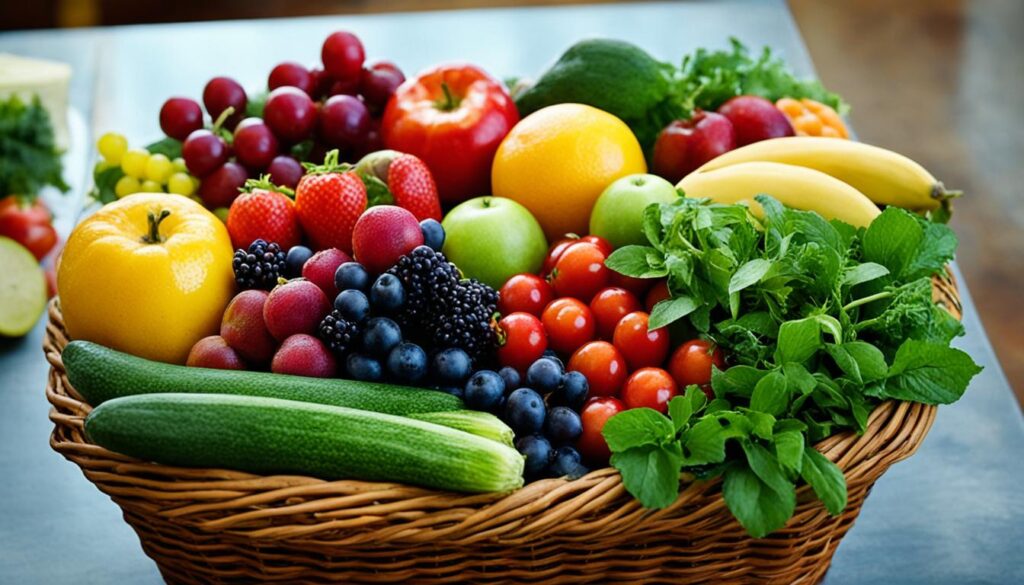
Meats and Animal Products
When it comes to bringing food to France, one important category to consider is meats and animal products. It’s crucial to understand the rules and restrictions surrounding these items to ensure compliance with French customs regulations and avoid any potential issues.
Please note: French customs have strict regulations regarding the importation of meats and animal products. These regulations are in place to protect public health, prevent the spread of diseases, and maintain the country’s agricultural and ecological balance.
If you are planning to bring meats or animal products with you to France, it is essential to familiarize yourself with the following guidelines:
- Commercially-packaged and sealed meats: You can bring commercially-packaged and sealed meats, such as deli meats or canned meat products, for personal consumption.
- Declared fresh or frozen meats: If you wish to bring fresh or frozen meats, you must declare them at customs upon arrival. They may be subject to additional scrutiny, including checks for compliance with veterinary health certificates and inspections by food safety officials.
- Restrictions on certain meats: To protect against the spread of diseases, some meats may be subject to specific restrictions or outright bans. For example, you may not be able to bring poultry, pork, or beef from certain countries affected by specific diseases or outbreaks.
It is crucial to note that French authorities take these regulations seriously, and failure to comply can result in hefty fines or other penalties.
“Bringing meats and animal products to France requires strict adherence to customs regulations and compliance with veterinary health certificates. Familiarize yourself with the guidelines to ensure a smooth entry and avoid any unnecessary complications.”
For a summarized overview of the rules and restrictions for meats and animal products when bringing food to France, refer to the following table:
| Food Item | Permissible? | Additional Notes |
|---|---|---|
| Commercially-packaged and sealed meats | Yes | No quantity restrictions, for personal consumption only |
| Fresh or frozen meats | Yes (Declared) | Subject to veterinary health certificates and inspections |
| Restricted meats | No | Susceptible to specific restrictions or bans |
Dairy Products and Eggs
When it comes to traveling to France with food items, it’s important to be aware of the specific rules and regulations set by French customs. This includes the importation of dairy products and eggs, which are subject to their own guidelines. By staying informed and understanding these regulations, you can ensure compliance and a hassle-free entry into the country.
French customs have specific restrictions on the importation of dairy products and eggs due to the potential risks associated with these perishable items. The goal is to safeguard the health and safety of the country’s agricultural industry and protect against the introduction of harmful diseases or contaminants.
If you are planning to bring dairy products or eggs with you to France, it’s crucial to familiarize yourself with the rules and restrictions. Here are some key considerations:
- Commercially Packaged Products: Commercially packaged and sealed dairy products, such as cheese or yogurt, are generally allowed as long as they are for personal use and not for commercial distribution.
- Importation Quantity: The quantity of dairy products or eggs you can bring may be limited. It is important to check the specific regulations and ensure that your quantities fall within the permitted limits.
- Documentation: It may be necessary to provide documentation, such as a health certificate or proof of origin, for certain dairy products or eggs. Check with the relevant authorities or your airline to determine the specific requirements.
Please note that these regulations may be subject to change, so it is always recommended to check with the official French customs website or consult with the relevant authorities before your trip.
Alcoholic Beverages
France is renowned for its exquisite wine and other alcoholic beverages, making it a dream destination for wine enthusiasts and connoisseurs. However, when bringing alcohol to France, it’s important to understand the regulations surrounding the importation of these products. By adhering to these guidelines, you can savor the flavors of France during your trip.
French customs allow the importation of alcoholic beverages in limited quantities for personal use. The amount of alcohol you can bring depends on the type and alcohol content. Here are some key points to keep in mind:
- Wine: You can bring up to 90 liters (approximately 24 gallons) of wine, including still wine, sparkling wine, and fortified wine. This generous allowance provides an opportunity to bring back some of France’s finest vintages.
- Other Alcoholic Beverages: Apart from wine, you are permitted to bring up to 10 liters (approximately 2.6 gallons) of other alcoholic beverages, such as spirits, beer, and liqueurs. This category encompasses a wide range of choices, allowing you to bring a taste of your favorite beverages from home.
It’s worth noting that these allowances are for personal use and not intended for commercial purposes. If you plan to carry larger quantities or intend to sell the alcohol in France, you may need to declare your items and follow additional regulations.
“Bringing home a bottle of French wine is a delightful way to cherish the memories of your trip and share a taste of France with family and friends.”
When packing alcoholic beverages, it’s essential to ensure they are securely wrapped and well-protected to prevent any breakage during transit. Additionally, it’s advisable to check with your airline regarding their specific regulations on carrying alcohol in your luggage.
French Alcohol: A Cultural Experience
In France, wine is more than just a beverage—it’s a cultural symbol deeply rooted in the country’s history and traditions. From the rolling vineyards of Bordeaux to the charming wineries of Burgundy, each region offers a unique terroir and flavor profile that reflects its distinct characteristics.
When visiting France, seize the opportunity to embark on wine tastings, cellar tours, and vineyard visits. Immerse yourself in the rich wine culture, learn about the winemaking process from passionate vintners, and unlock the secrets of wine pairing with delectable French cuisine.
Sampling French Terroirs: Wine Regions in France
France boasts numerous wine regions, each with its own terroir and grape varietals. Here are some of the iconic wine regions to explore:
| Wine Region | Notable Varietals |
|---|---|
| Bordeaux | Merlot, Cabernet Sauvignon, Cabernet Franc |
| Burgundy | Pinot Noir, Chardonnay |
| Rhône Valley | Syrah, Grenache, Roussanne, Viognier |
| Champagne | Pinot Noir, Chardonnay, Pinot Meunier |
| Alsace | Riesling, Gewürztraminer, Pinot Gris |
These are just a few examples of the diverse French wine regions waiting to be explored. Each region offers its own unique flavors and characteristics, ensuring a truly memorable wine experience.
Remember to enjoy alcohol responsibly and be mindful of the legal drinking age in France, which is 18 for wine and beer, and 21 for spirits. By respecting the regulations and immersing yourself in the culture, you can savor the essence of French winemaking and create lifelong memories.
Special Dietary Considerations
If you have special dietary considerations, such as gluten-free, vegan, or kosher foods, it’s important to plan ahead to ensure that you can continue to adhere to your dietary restrictions while in France.
While bringing food from home may be limited, there are still options available to accommodate your needs. Many supermarkets and health food stores in larger cities like Paris and Lyon offer a range of specialty products for those with dietary restrictions. Look for stores that carry organic and health-conscious foods, as they are more likely to have a wider variety of options.
Additionally, you can explore local farmers markets to find fresh produce and artisanal products that cater to specific dietary needs. These markets often have stalls selling gluten-free bread, vegan spreads, and other allergen-friendly items. Don’t be afraid to ask the vendors about the ingredients and preparation methods to ensure they meet your dietary requirements.
“France has a thriving food culture that has embraced diverse dietary preferences. From gluten-free bakeries to vegan-friendly restaurants, you can find options that cater to your specific needs.”
When dining out, it’s helpful to inform the restaurant staff about your dietary restrictions. Many establishments are familiar with accommodating different dietary needs and can provide suitable alternatives or make adjustments to existing dishes. It’s always best to communicate your preferences in advance to avoid any misunderstandings.
Key Tips:
- Research supermarkets and health food stores that cater to special dietary needs in your destination city.
- Visit farmers markets to find fresh produce and artisanal products that comply with your dietary restrictions.
- Inform restaurant staff about your dietary needs in advance to ensure a seamless dining experience.
Remember, even though there may be some limitations, France has a thriving food culture that has embraced diverse dietary preferences. From gluten-free bakeries to vegan-friendly restaurants, you can find options that cater to your specific needs.
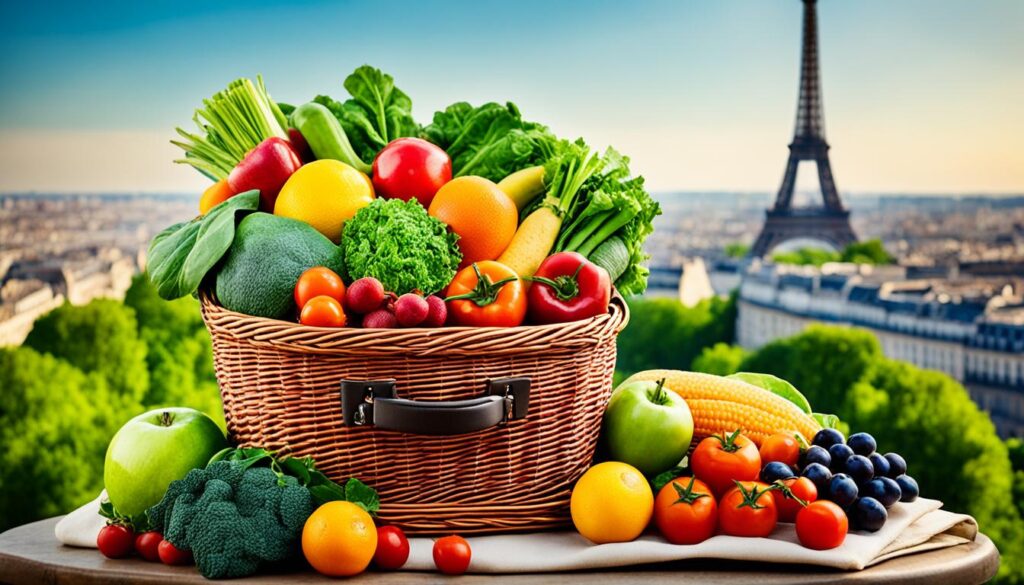
Commercially Packaged and Sealed Foods
When it comes to bringing food to France, commercially packaged and sealed foods are subject to specific regulations. While some food items may be allowed without any issues, others may require additional scrutiny. In this section, we will discuss the guidelines for commercially packaged and sealed foods, ensuring you are well-prepared for your trip.
Types of Commercially Packaged and Sealed Foods
Commercially packaged and sealed foods encompass a wide range of products, including:
- Canned goods
- Packaged snacks
- Boxed meals
- Sealed beverages
These items are typically sold in supermarkets and grocery stores, with clearly labeled packaging and expiration dates. They are considered safe for consumption and pose minimal risk in terms of food safety and agricultural regulations.
What to Keep in Mind
While commercially packaged and sealed foods are generally allowed, there are a few important factors to consider:
- Transportation: Ensure that the packaging remains intact during your journey. Any tampering or damage may raise concerns at customs.
- Labelling: Check that all labels are in a language you understand and comply with French regulations. Nutritional information, ingredients, and allergen declarations should be clearly stated.
- Quantity: It is important to bring a reasonable quantity of commercially packaged and sealed foods for personal use. Large quantities may raise suspicions of commercial importation.
Declaration Process
When you arrive in France, you may be required to declare the commercially packaged and sealed foods you are bringing. Follow these steps to ensure a smooth declaration process:
- Clearly separate the commercially packaged and sealed foods from other items in your luggage.
- Proceed to the designated customs area and inform the officer that you have declared food items.
- Provide any necessary details requested by the customs officer, such as the type and quantity of the food items.
- Answer truthfully if any additional questions are asked regarding the purpose of the food items or their intended use during your stay.
By adhering to these guidelines and openly declaring your commercially packaged and sealed foods, you can navigate French customs smoothly without any unnecessary delays or complications.
Non-Permissible Foods
When traveling to France, it’s essential to be aware of the foods that are not allowed to be brought into the country. Understanding the import regulations on food in France and the food restrictions in France will help you avoid any potential issues with customs and ensure a smooth entry into the country.
Prohibited Food Items
French customs strictly prohibits the following food items from being brought into the country:
- Meat products, including fresh, frozen, or dried meats
- Poultry products, including chicken, turkey, and duck
- Fish and seafood, unless it has been processed and properly packaged
- Dairy products, including milk, cheese, and butter
- Eggs, including fresh eggs and products containing eggs
- Fruits and vegetables that are not properly packaged and declared
- Plants, seeds, and bulbs that pose a risk to the environment
- Live animals, including pets and insects
- Illegally obtained or protected wildlife, including endangered species
- Products containing endangered plant or animal species
These restrictions are in place to protect public health, prevent the introduction of non-native species, and preserve the environment. Failure to comply with these regulations can result in fines, confiscation of the prohibited items, and even legal consequences.
“French customs takes food restrictions seriously to safeguard the country’s agriculture, public health, and natural resources. Make sure you familiarize yourself with the import regulations and avoid bringing any prohibited food items to France.”
It’s crucial to carefully review the list of non-permissible foods before your trip and ensure that you do not pack any of these items. Instead, focus on enjoying the wide variety of delicious French cuisine and exploring the local food experiences that the country has to offer.
Exceptions and Special Circumstances
While there are strict regulations on certain food items, there may be exceptions or special circumstances for specific situations. For example, individuals with dietary restrictions or medical conditions may be allowed to bring certain foods if they have the necessary documentation and approvals.
If you believe you have a valid reason for bringing a non-permissible food item into France, it’s important to contact the appropriate authorities ahead of time to seek guidance and obtain the required permits or authorizations. This will help you navigate the import regulations effectively and ensure a smooth experience at customs.
By respecting the food restrictions in France and complying with the import regulations, you can enjoy a worry-free trip to this culinary haven without any unnecessary complications.
Declaring Food Items at Customs
If you are unsure about a particular food item that you want to bring to France, it is best to declare it at customs. By declaring your food items, you can ensure a smooth and hassle-free entry into the country without any issues with French customs.
Why should you declare your food items at customs?
Declaring your food items at customs is a responsible and necessary step to follow. It helps French customs officials assess the items you are bringing into the country and determine if they comply with the regulations on food importation. By declaring your food items, you demonstrate your respect for French customs food regulations and contribute to safeguarding public health and safety in France.
Here are some tips to help you navigate the declaration process at French customs:
- Research and familiarize yourself with the French customs regulations on food importation.
- Prepare a list of the food items you are carrying, including their names, quantities, and their purpose (personal use or gifts).
- When you arrive at customs, approach the designated declaration desk or officer.
- Be honest and transparent about the food items you are declaring, providing accurate information.
- Follow any instructions given by customs officials and answer their questions truthfully.
- Pay attention to any additional requirements or inspections that customs officials may request.
- Remain calm and patient throughout the declaration process, understanding that it is for the benefit of everyone’s safety.
What happens after declaring your food items?
After declaring your food items, customs officials will assess the items based on their compliance with the regulations. In some cases, they may inspect the food items or request additional documentation. If the items are deemed permissible, you will be allowed to proceed with your journey. Otherwise, customs officials may impose certain restrictions or confiscate prohibited items.
“Declaring your food items at customs is an essential step to ensure compliance with French customs regulations. It not only helps maintain the integrity of the country’s agricultural and public health systems, but also allows for a smoother travel experience.”
| Benefits of declaring food items | Tips for smooth declaration process | After declaring your food items |
|---|---|---|
| – Compliance with French regulations | – Research customs regulations | – Assessment by customs officials |
| – Safeguarding public health | – Prepare a list of food items | – Possible inspection or documentation request |
| – Smooth travel experience | – Be honest and transparent | – Permissible items: proceed with journey |
Local Food Experiences in France
While bringing food from home is limited, you can still indulge in the wide variety of local culinary experiences that France has to offer. Exploring the traditional French cuisine and savoring the local delicacies will certainly enhance your trip and create lasting memories.
France is renowned for its world-class cuisine, from the buttery croissants and pain au chocolat at breakfast to the exquisite cheese platters and decadent desserts. Each region in France has its own culinary specialties, showcasing the country’s rich gastronomic heritage.
“French cuisine is a delightful combination of flavors, techniques, and traditions. It has influenced countless culinary cultures around the world and continues to be revered for its sophistication and artistry.”
Indulge in the gastronomic delights of Paris, where you can try escargots (snails) or coq au vin (chicken cooked in red wine). Head to Lyon, the gastronomic capital of France, to savor the famous Lyonnaise dishes such as quenelles de brochet (pike dumplings) and Île flottante (floating island dessert).
Visit the Provence region to enjoy the vibrant flavors of Ratatouille, bouillabaisse (fish stew), and the refreshing summer dish, salade niçoise. In Bordeaux, taste the renowned wines paired with delectable foie gras and confit de canard (duck confit).
Don’t miss out on the seafood delights of Brittany, where you can savor freshly caught oysters, mussels, and the famous Breton crêpes. And no visit to the Alsace region is complete without trying the soul-warming choucroute garnie (sauerkraut with sausages and pork).
Immerse yourself in the local food markets, where you can explore a cornucopia of fresh produce, aromatic cheeses, and tantalizing pastries. Interact with local vendors and discover the ingredients that make French cuisine so exceptional.
French traditions and customs surrounding food are deeply ingrained in the culture. From enjoying long meals with family and friends to appreciating the artistry of food presentation, the food experiences in France are as much about the ambiance as they are about the flavors.
The French “Art de Vivre”
French cuisine is not just about the food; it’s a way of life. Enjoy leisurely meals in charming bistros, dine al fresco at quaint cafes, or indulge in Michelin-starred gastronomic experiences. Every meal in France is an opportunity to savor the moment, connect with loved ones, and embrace the French “art de vivre” – the art of living.
So, while your options for bringing food to France may be limited, rest assured that the country’s culinary offerings will more than make up for it. Immerse yourself in the local food culture, expand your palate, and embark on a gastronomic adventure that will leave you craving for more.
Conclusion
In conclusion, when traveling to France, it is essential to be mindful of the regulations set by French customs regarding the importation of food items. By understanding and adhering to these rules and restrictions, you can ensure a smooth and hassle-free journey.
When it comes to bringing food to France, it is important to note that there are specific guidelines for different types of food items. While some packaged and non-perishable foods are generally permitted, extra caution is required when it comes to fresh fruits and vegetables, meats and animal products, dairy products and eggs, and alcoholic beverages.
To avoid any potential issues with customs, it is advisable to familiarize yourself with the rules and restrictions surrounding the importation of these food items. It is also helpful to declare any uncertain items at customs to ensure compliance with French regulations.
While bringing food from home may have limitations, one of the highlights of visiting France is undoubtedly the opportunity to indulge in the country’s rich culinary traditions and flavors. From trying local delicacies to dining at renowned restaurants, be sure to immerse yourself in the vibrant food culture of France during your visit.



